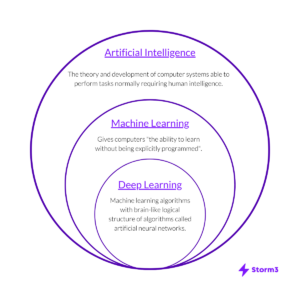Artificial Intelligence (AI) has emerged as a powerful tool in revolutionizing various industries, and Genomics is no exception. Advancing us from data to knowledge, the integration of AI with genomics Tech has opened new avenues for understanding and manipulating the human genome; a synergy that is accelerating research, personalizing medicine, and transforming the field.
In this article, we’ll debunk the AI in genomics market, covering the size of the industry, how AI is being used to advance genomics, and the future of this disruptive technology.
AI In Genomics: Market Size
The AI in genomics market is soaring; estimates show that it will grow to a value of $2 billion by 2028. But what is fuelling such growth?
- The rising demand for precision medicine
- Cost reduction and efficiency improvements
- Government initiatives and funding
- The potential for breakthrough discoveries
These factors – and more – have created a rich environment for the growth and success of AI in genomics, with promising implications for healthcare and scientific advancements.
Artificial Intelligence Vs Machine Learning Vs Deep Learning
These names are often used interchangeably, but what is it that makes each of them a unique technology? An easy way to understand the relationship between Artificial Intelligence (AI), Machine Learning (ML), and Deep Learning is to think of them as a subfield of one another:

That is, Machine Learning is a subfield of Artificial Intelligence, Deep Learning is a subfield of Machine Learning, and both fall under the umbrella category of Artificial Intelligence.
Why Is There A Need For AI And Machine Learning In Genomics?
Over 20 years have passed since the landmark completion of the draft human genome sequence and this milestone has led to the generation of an exceptional amount of genomic data. In fact, estimates predict that genomics research will generate between two and 40 exabytes of data over the next decade.

DNA sequencing and other biological techniques will continue to expand the number and complexity of these datasets. This is why genomics researchers need AI and ML-based computational skills that can manage, extract, and interpret the valuable information hidden within this huge trove of data.
How Are AI And ML Boosting Genomics?
From predicting how a particular cancer will progress in a patient to analyzing people’s faces with facial analysis AI programs to identify genetics disorders, the field of genomics is already hugely benefitting from AI and Machine Learning tools. Below is a breakdown of five areas where AI in genomics is making impressive improvements:
Data Analysis
Genomics generates massive amounts of complex data. AI techniques like Machine Learning and Deep Learning can analyze and interpret this data more efficiently and accurately than traditional methods, identifying patterns, detecting genetic variations, and predicting disease risks.
Genome Sequencing
AI has made significant contributions to genome sequencing. It helps in optimizing sequencing processes, reducing errors, and enhancing the speed of DNA sequencing. AI algorithms can also aid in assembling fragmented DNA sequences, which is crucial for generating complete genomes.
Drug Discovery And Development
Traditional drug discovery processes are time-consuming and costly. AI algorithms can analyze vast amounts of genomic and chemical data to identify potential drug targets, predict drug efficacy, and optimize drug design. This not only accelerates the drug discovery process but reduces costs significantly.
Precision Medicine
AI enables the integration of genomic information with clinical data to develop personalized treatment plans. By analyzing a patient’s genomic profile, AI algorithms can predict disease risks, identify optimal treatment options, and determine drug dosages tailored to individual patterns. This personalized approach has immense potential to improve patient outcomes and reduce adverse effects.
Gene Editing
AI can enhance gene editing technologies like CRISPR by predicting the potential off-target effects of gene editing interventions. By analyzing genomic sequences, AI algorithms can predict the likelihood of unintended genetic modifications, allowing researchers to optimize the design of gene editing tools and increase their precision.

The Future Of Genomics Technologies And AI
The typical costs of sequencing a human genome today are in the $1,000 range. Scaling is a short-term solution to reducing costs, but not every lab has the rationale or capacity to sequence tens or hundreds of genomes per day. Fortunately, the technological advancements being adopted by genomics companies are now challenging the status quo with solutions that promise reduced costs, speed, and portability.
As the potential for genomic analysis as a diagnostic tool continues to grow exponentially, AI applications are rising to the challenge, focusing on tasks that’re currently impractical or impossible to perform at speed or scale. Of course, technologies, policies, and methodologies need further development to fully de-risk the use of AI in decision-making as well as to ensure access to DNA sequencing is applied equitably. Nevertheless, the potential for these technologies to revolutionize genomics is huge.
How Storm3 Can Help You
At Storm3, we connect top talent with the most innovative HealthTech companies across the globe. Our team of expert consultants have a deep network of highly specialized talent across Data & Analytics, Engineering, DevOps, Finance & Operations, Product Management, and Sales & Marketing. If you’re looking to scale your team, get in touch today!






